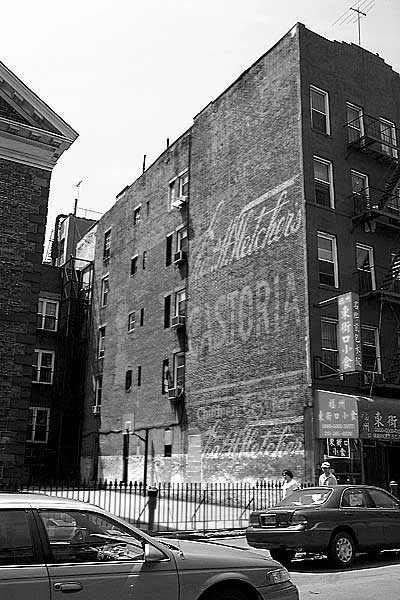

 Fletcher's Castoria, 13 Market St. between Henry St. and East Broadway, New York, 2001
Fletcher's Castoria, 13 Market St. between Henry St. and East Broadway, New York, 2001

None Genuine Without This Signature.
Children Cry For Chas. H. Fletcher's Castoria
Fletcher's Castoria derives from a mixture of senna, sodium bicarbonate, wintergreen, taraxicum, sugar and water patented by Samuel Pitcher of Barnstable, Mass. in 1868. Pitcher's Castoria was advertised as "... a Pleasant and Complete Substitute for Castor Oil...," especially for children. And, like Fletcher's, "Children Cry for Pitcher's Castoria." See The Olden Times for 1887 ad. In 1986 there was still a remnant of a Pitcher's Castoria sign on Greenwich St. near Desbrosses St. (Click for image). A 1941 view of the Pitcher's Castoria sign is found on the New York Public Library's Digital Collections (for the NYPL image you have to Zoom, click on the middle photo a couple of times to get the size you want, then click on the rotate button).
Another NYPL view of this same sign is available here.
The rights to Pitcher's Castoria were acquired by J. B. Rose & Co. around 1871/72. J. B. Rose & Co. also made Centaur Liniment, for which there were 2 versions, one for people and one for animals. (The name Centaur referred to the half man, half horse creatures of Greek mythology.) Thus, J. B. Rose & Co. came to be known as the "Centaur" company, and in 1877 they were re-named the Centaur Company with Demas S. Barnes and Charles H. Fletcher as principals.
In 1888 Fletcher (who had registered his signature as a trade mark in addition to the name Fletcher's Castoria) assumed control of the Centaur Co. He continued to promote Fletcher's Castoria until his death in 1922. The following year Sterling Products Company paid $3,500,000 for a one-quarter interest in the Centaur Co. Eventually the Household Products Inc. division of Sterling Products became sole owner of Fletcher's Castoria.
Currently (2001) Fletcher's Castoria is manufactured and sold by the Mentholatum Co., who bought the rights from Sterling Drug in 1984.
This ad for Castoria appeared in the New York Times, September, 1899. It gives Pitcher's Recipe for the product, and is at some pains to assure buyers that it is not narcotic and only composed of nature's own most benign ingredients. Does this remind you of Melville's The Confidence Man?
This advertisement for the Centaur Co. appeared in Spatula (a magazine for druggists) in Oct. 1914. At this time the Centaur Co. was located at 250 West Broadway.
This Castoria sign can be seen in the distance in a photo by Edmund Gillon in the collections of the Museum of the City of New York. This image is dated ca. 1979. Edmund V. Gillon, Jr. did the photographs in Margot Gayle's Cast-Iron Architecture in New York (1974).
Copyright © 2002 Walter Grutchfield